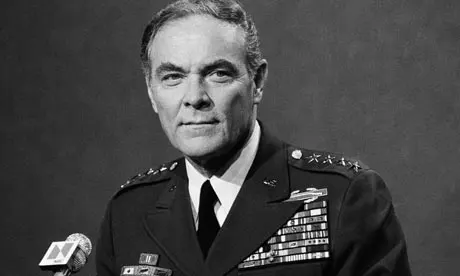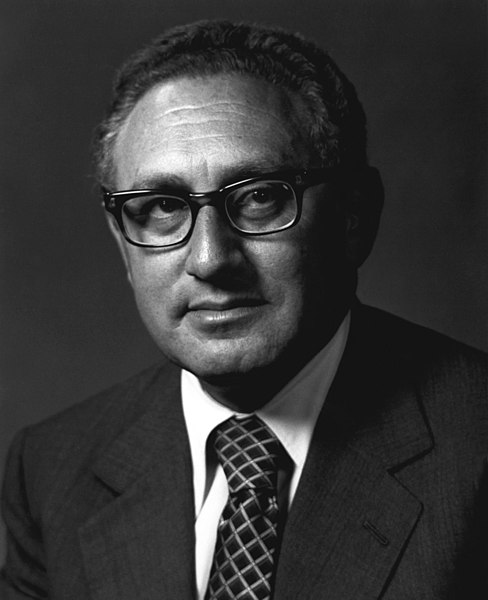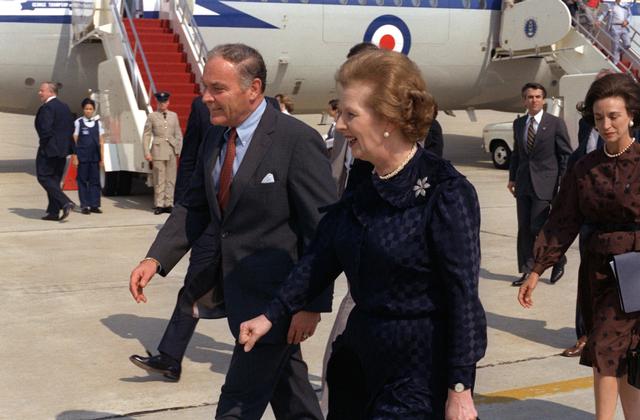Argentine flag-raising in Stanley by Serge Briez, 1982
"In a sense, every obstacle for negotiations in general was an obstacle for Haig, but among these were specific problems with his mission which prevented him from being as effective as he could have been."
~ Joseph Mauro, The Falkland Islands War: Diplomatic Failure in April 1982, 2010
US Secretary of State Alexander Haig

Alexander Haig, US Department of Defense, Wikimedia Commons, 1982
“Alexander Meigs Haig, Jr. was appointed Secretary of State by President Ronald Reagan and assumed the office on January 22, 1981. He served a relatively short time in office, facing many challenging situations before stepping down on July 5, 1982...his efforts to broker diplomatic resolutions to the disputes over the Falkland Islands and in the Middle East did not succeed."
~ US Department of History
Throughout the negotiation process, Alexander Haig faced several difficulties, which in turn resulted in unsuccessful negotiations. He wanted to apply the methods that Henry Kissinger had used in the Middle East to successfully negotiate peace settlements. However, there was a slight problem: the distances between the two capitals. Kissinger only had to fly a few hours to travel from capital to capital, but Haig was constantly flying from London, Great Britain to Buenos Aires, Argentina, an 18-hour trip. Haig couldn't travel between each country as frequently and therefore the countries' leaders were forced to work through the negotiations themselves for the most part. Since he was travelling more than discussing negotiations, hardly any progress was ever made.
"[Kissinger] alternated between threats and flattery in trying to cajole the Israelis, the Egyptians, and the Syrians into negotiating. I think the reason that I titled the book “Master of the Game” was precisely that he was so good at those kinds of things, which are necessary for great diplomats. The art of diplomacy is to move leaders to places where they’d rather not go, and he was masterful at that."
~ Martin Indyk, Interview with Isaac Chotiner, 2021

Henry Kissinger, US Department of State, Wikimedia Commons, 1973

Haig Arriving in London, US Department of Defense, Wikimedia Commons, 1982
"One of the advantages a negotiator can possess is to apply constant pressure on a government to continue thinking about acceptable proposals. However, Haig could not apply constant pressure on the junta because, when he was gone, he was so far away that the military leaders could disregard him."
~ Joseph Mauro, The Falkland Islands War: Diplomatic Failure in April 1982, 2010
The long distances between Great Britain and Argentina also provided a false sense of hope for diplomacy to prevail. Time-consuming negotiations were viewed as stalling method and people ignored the consequences of this arrangement.
"The Argentinians would soon realize the extent of their effrontery and their isolation from the rest of world opinion, and withdraw. We comforted ourselves with the thought that powerful diplomatic machinery was available to shift the protagonists off a collision course before the crash happened and there was, it appeared, plenty of time."
~ John Witherow, The Winter War, 2012
Professor Lowell S. Gustafson, 30 January 2022
"It was also a sensible choice from a political point of view. The time it would take troops to get to the other side of the island left plenty of opportunity for diplomacy to be resurrected and an Argentinian surrender before a battle for the capital became necessary."
~ Patrick Bishop, Battle for the Falklands, 2012
"We must find an element that brings cohesion to society and the country. That element is Malvinas."
~Admiral Jorge Isaac Anaya, 1982